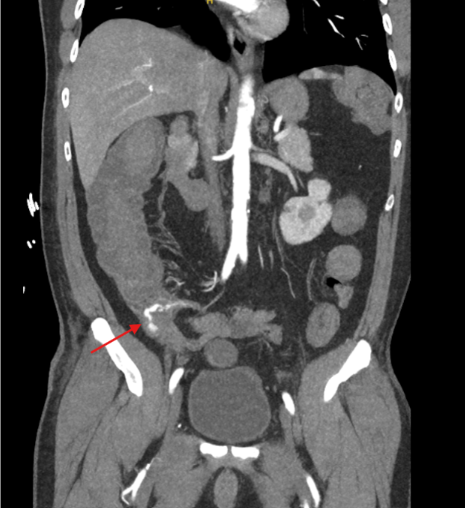Sunday Poster Session
Category: GI Bleeding
P0987 - Coil Embolization of Appendiceal Artery Bleed Leading to Appendicitis and Surgical Resection: A Case Report
Sunday, October 26, 2025
3:30 PM - 7:00 PM PDT
Location: Exhibit Hall

Omar Brijawi, MD
Mount Carmel Health System
Columbus, OH
Presenting Author(s)
Omar Brijawi, MD1, Katherine Guardado, DO2, Khizar Ghuman, DO2
1Mount Carmel Health System, Grove City, OH; 2Mount Carmel Health Systems, Grove City, OH
Introduction: Appendiceal bleeding is an infrequent cause of lower gastrointestinal bleeding (LGIB), accounting for only 0.014% of cases. Etiologies include diverticulitis, angiodysplasia, Dieulafoy’s lesions, neoplasms, and inflammation. Diagnosis is often delayed due to intermittent bleeding and poor endoscopic visibility. Current guidelines recommend that hemodynamically unstable patients with suspected LGIB undergo urgent computed tomography angiography (CTA) to localize the source, followed by endoscopic or radiologic intervention. Transcatheter arterial embolization (TAE) is an effective option in such cases; however, embolizing end-arterial branches, such as the appendiceal artery, carries a theoretical risk of ischemia.
Case Description/
Methods: We present the case of a 48-year-old male on heparin for suspected acute coronary syndrome who developed acute LGIB. Colonoscopy was inconclusive, and CTA revealed active extravasation from the appendicular branch of the ileocolic artery. The patient underwent successful coil embolization. However, he developed signs of peritonitis the following day. Repeat imaging raised concern for appendicitis, and appendectomy confirmed the diagnosis. He recovered fully without recurrence of bleeding.
Discussion: To our knowledge, this is the first reported case of appendicitis following coil embolization of the appendiceal artery. The appendix is uniquely vulnerable to ischemia due to its solitary arterial supply. While TAE offers a potential therapeutic option in managing appendiceal hemorrhage, this case highlights the need for clinicians to remain vigilant for post-embolization appendicitis and the importance of early surgical consultation.

Figure: Figure 1: CT angiogram of the abdomen and pelvis showing active contrast extravasation noted at the base of the cecum and appendix (red arrow).

Figure: Figure 2: Red blood and clot seen in the cecum (A). Colonoscopy examination of the appendiceal orifice with red blood and clot, but no bleeding lesion identified (B).
Disclosures:
Omar Brijawi indicated no relevant financial relationships.
Katherine Guardado indicated no relevant financial relationships.
Khizar Ghuman indicated no relevant financial relationships.
Omar Brijawi, MD1, Katherine Guardado, DO2, Khizar Ghuman, DO2. P0987 - Coil Embolization of Appendiceal Artery Bleed Leading to Appendicitis and Surgical Resection: A Case Report, ACG 2025 Annual Scientific Meeting Abstracts. Phoenix, AZ: American College of Gastroenterology.
1Mount Carmel Health System, Grove City, OH; 2Mount Carmel Health Systems, Grove City, OH
Introduction: Appendiceal bleeding is an infrequent cause of lower gastrointestinal bleeding (LGIB), accounting for only 0.014% of cases. Etiologies include diverticulitis, angiodysplasia, Dieulafoy’s lesions, neoplasms, and inflammation. Diagnosis is often delayed due to intermittent bleeding and poor endoscopic visibility. Current guidelines recommend that hemodynamically unstable patients with suspected LGIB undergo urgent computed tomography angiography (CTA) to localize the source, followed by endoscopic or radiologic intervention. Transcatheter arterial embolization (TAE) is an effective option in such cases; however, embolizing end-arterial branches, such as the appendiceal artery, carries a theoretical risk of ischemia.
Case Description/
Methods: We present the case of a 48-year-old male on heparin for suspected acute coronary syndrome who developed acute LGIB. Colonoscopy was inconclusive, and CTA revealed active extravasation from the appendicular branch of the ileocolic artery. The patient underwent successful coil embolization. However, he developed signs of peritonitis the following day. Repeat imaging raised concern for appendicitis, and appendectomy confirmed the diagnosis. He recovered fully without recurrence of bleeding.
Discussion: To our knowledge, this is the first reported case of appendicitis following coil embolization of the appendiceal artery. The appendix is uniquely vulnerable to ischemia due to its solitary arterial supply. While TAE offers a potential therapeutic option in managing appendiceal hemorrhage, this case highlights the need for clinicians to remain vigilant for post-embolization appendicitis and the importance of early surgical consultation.

Figure: Figure 1: CT angiogram of the abdomen and pelvis showing active contrast extravasation noted at the base of the cecum and appendix (red arrow).

Figure: Figure 2: Red blood and clot seen in the cecum (A). Colonoscopy examination of the appendiceal orifice with red blood and clot, but no bleeding lesion identified (B).
Disclosures:
Omar Brijawi indicated no relevant financial relationships.
Katherine Guardado indicated no relevant financial relationships.
Khizar Ghuman indicated no relevant financial relationships.
Omar Brijawi, MD1, Katherine Guardado, DO2, Khizar Ghuman, DO2. P0987 - Coil Embolization of Appendiceal Artery Bleed Leading to Appendicitis and Surgical Resection: A Case Report, ACG 2025 Annual Scientific Meeting Abstracts. Phoenix, AZ: American College of Gastroenterology.
